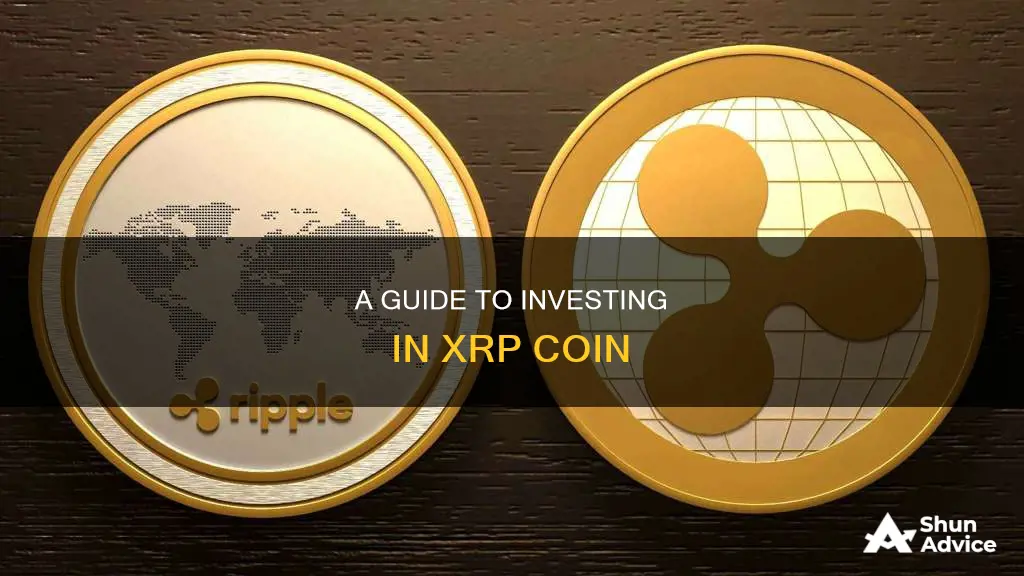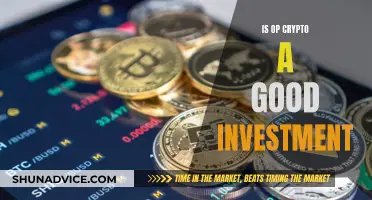
XRP is a cryptocurrency with a unique consensus protocol that utilizes a network of more than 150 validators. It is the native token for the XRP ledger, which was designed as a payment system for business purposes. XRP is also the native token for Ripple, a payments network that is designed to serve the financial services industry. It is one of the largest cryptocurrencies by market capitalization, with a value of more than $30 billion as of 2022.
XRP can be purchased on several exchanges, such as Bitstamp, Kraken, Huobi Global, and Coinbase. It can also be purchased on decentralized exchanges such as Uniswap and PancakeSwap.
What You'll Learn
- Choosing a platform: XRP can be purchased on several exchanges, including Binance, Coinbase, Kraken, and Bybit
- Payment methods: Decide whether to buy XRP with fiat currency or another cryptocurrency
- Storage options: Consider storing XRP in a digital wallet or directly on an exchange
- Risks and volatility: Understand the risks associated with investing in XRP, including regulatory and legal issues
- XRP's advantages: XRP offers faster transaction speeds and lower fees compared to other cryptocurrencies

Choosing a platform: XRP can be purchased on several exchanges, including Binance, Coinbase, Kraken, and Bybit
When it comes to choosing a platform to purchase XRP, there are several exchanges to consider, each with its own unique features and benefits. Here is an overview of some popular options:
Binance
Binance is a centralized exchange that offers a wide range of cryptocurrencies, including XRP. To use the platform, you'll need to create an account and verify your identification. Binance provides multiple payment options, such as debit/credit cards, Google Pay, Apple Pay, and various third-party payment channels. The exchange also offers advanced trading tools, high security, and low fees, making it a popular choice for many crypto traders.
Coinbase
Coinbase is another well-known centralized exchange that allows users to buy, sell, and trade XRP. It is regulated and offers fiat currency support, making it easier to purchase XRP with US dollars or other fiat currencies. Coinbase also provides a custodial wallet service, giving users a convenient way to store their XRP.
Kraken
Kraken is a leading centralized exchange that supports XRP trading. It offers a user-friendly interface and a variety of payment options, including fiat currencies. Kraken also provides a custodian wallet service, ensuring the security of your XRP holdings. The exchange has a strong focus on security and is trusted by many traders.
Bybit
Bybit is another reputable centralized exchange where you can buy and sell XRP. It offers a range of features and payment methods to cater to your trading needs. Bybit is known for its user-friendly interface and robust security measures, making it a reliable option for those new to crypto trading.
When choosing a platform, it's important to consider factors such as security, ease of use, payment options, and regulatory compliance. Each exchange has its own unique features, so be sure to research and compare them before making your decision. Remember to always assess the risks and volatility associated with investing in cryptocurrencies before committing any funds.
A Small Bitcoin Investment: Can It Make You a Millionaire?
You may want to see also

Payment methods: Decide whether to buy XRP with fiat currency or another cryptocurrency
When investing in XRP, you can choose to buy it with fiat currency or another cryptocurrency.
Buying XRP with Fiat Currency
You can buy XRP with fiat currency on several crypto exchanges, including Bitstamp, Kraken, Huobi Global, and Coinbase. These exchanges allow you to exchange fiat currencies, such as the US dollar, for XRP.
To buy XRP with fiat currency, you will need to:
- Choose a crypto exchange that supports XRP trading and accepts your desired fiat currency.
- Create an account on the exchange and provide the necessary information, such as your name, email address, and password. Some exchanges may also require additional information, such as proof of ID, for security and regulatory compliance.
- Deposit funds into your exchange account using your chosen fiat currency.
- Find the XRP currency on the exchange and enter the amount you want to invest.
- Purchase the XRP and store it in a secure wallet.
Buying XRP with Another Cryptocurrency
Alternatively, you can buy XRP with another cryptocurrency. This option typically involves using a decentralized crypto exchange or a crypto wallet that supports XRP.
- Choose a decentralized exchange or a crypto wallet that supports XRP trading. Examples of decentralized exchanges that support XRP include PancakeSwap, SimpleSwap, and onXRP.
- Create an account on the chosen platform and set up your crypto wallet, if necessary.
- Deposit the cryptocurrency you want to use to purchase XRP into your wallet or exchange account. Ensure that the cryptocurrency you are using is compatible with the exchange or wallet.
- Find the trading pair that includes XRP and the cryptocurrency you are using. For example, if you are using Bitcoin, look for the XRP/BTC trading pair.
- Specify the amount of XRP you want to buy or the amount of the other cryptocurrency you want to spend.
- Finalize the transaction and purchase the XRP.
Both options have their advantages and considerations. Buying XRP with fiat currency may be easier and more straightforward, especially for those new to crypto trading. On the other hand, buying XRP with another cryptocurrency may offer more privacy and control over transactions but could have lower liquidity and higher transaction costs.
LocalCoinswap ICO: Worth Investing or Just Another Scam?
You may want to see also

Storage options: Consider storing XRP in a digital wallet or directly on an exchange
XRP can be stored in a number of different ways, including hardware, desktop, mobile, exchange, and paper wallets.
Hardware wallets are a common way to store digital assets. These devices store the private keys to the owner's assets and allow them to interact with the wallet without exposing their private data. Ledger, Trezor, and Keystone are some examples of hardware wallets that support XRP.
Desktop wallets are programs or apps downloaded to a computer or laptop to store and manage crypto assets. Mobile wallets are similar but run on mobile devices and are often considered less secure than hardware wallets. Trust Wallet and GateHub are examples of mobile wallets that support XRP.
Exchange wallets are provided by cryptocurrency exchanges such as Coinsmart, Crypto.com, and Binance. These wallets allow users to store their crypto on the exchange where they purchased it. This option may be more convenient for those who plan to buy, sell, or trade their XRP frequently.
Paper wallets are physical pieces of paper that hold crypto-asset details, such as wallet addresses and private keys. While they offer a high degree of security, they are less durable than other wallet types and are more susceptible to phishing efforts and other avenues of asset loss.
When choosing a storage option for XRP, it is important to consider factors such as security, ease of use, compatibility, and cost. Additionally, it is crucial to prioritize the safe storage of private keys and backup phrases to protect your crypto assets from theft or loss.
Syscoin Investment: Is It Worth Your Money?
You may want to see also

Risks and volatility: Understand the risks associated with investing in XRP, including regulatory and legal issues
XRP is a cryptocurrency with unique advantages and disadvantages. However, as with any investment, there are risks involved in backing XRP. Here are some of the risks and volatility factors to consider:
Regulatory and Legal Issues
In December 2020, the U.S. Securities and Exchange Commission (SEC) filed a lawsuit against Ripple, alleging that the company sold XRP as an unregistered security. The SEC claimed that Ripple violated U.S. securities laws by selling $1.3 billion worth of XRP tokens. This lawsuit has resulted in XRP being unavailable or delisted on many major U.S. and global cryptocurrency exchanges, such as Coinbase, Binance, and Kraken. The ongoing legal battle has also kept XRP's price down, preventing it from reaching its previous highs. While Ripple scored a partial victory in July 2023, with a judge ruling that XRP is not a security when sold on exchanges to retail investors, the SEC case is still ongoing and poses a significant risk to investors.
Volatility and Market Risk
XRP, like other cryptocurrencies, is highly volatile. The value of XRP can fluctuate drastically in a short period, and investors must be prepared for the possibility of losing all their investment. Market conditions, news, and events can significantly impact the price of XRP. For example, the cryptocurrency market slumped after China's crackdown announcement and Elon Musk's statement that Tesla would not accept crypto payments. XRP's value is also influenced by the broader cryptocurrency market, particularly Bitcoin, so investors should be aware of the potential for high price volatility.
Centralization Concerns
Ripple, the company behind XRP, controls a significant portion of the total supply of XRP. Critics argue that this gives Ripple centralized control over the cryptocurrency, which goes against the decentralized nature of blockchain and cryptocurrency. Ripple's insiders, including the chairman and CEO, hold a large number of XRP tokens, raising concerns about potential price manipulation or overinflation.
Competition and Adoption
XRP's success is heavily dependent on its ability to replace or compete with established payment networks like SWIFT. While XRP offers faster and cheaper transactions, SWIFT already has a strong foothold in the banking industry, with over 11,000 financial institutions as partners. Additionally, many of Ripple's partner institutions use its payment network but do not utilize the XRP token due to its volatility. This disconnect between Ripple's technology and the actual use of XRP could impact its long-term success.
Investor Suitability
Given the risks and volatility associated with XRP, it may not be a suitable investment for all individuals. XRP is considered a high-risk, high-return investment, even compared to other cryptocurrencies. Investors should carefully consider their risk tolerance, conduct thorough research, and only invest what they can afford to lose. Diversifying one's portfolio by investing in other cryptocurrencies or assets can help mitigate the risks associated with XRP.
Dogecoin Investment Strategies: Making Smart Choices
You may want to see also

XRP's advantages: XRP offers faster transaction speeds and lower fees compared to other cryptocurrencies
XRP offers faster transaction speeds and lower fees compared to other cryptocurrencies.
XRP transactions are typically processed and confirmed within 3 to 5 seconds, whereas Bitcoin transactions can take anywhere from 10 minutes to several hours. XRP transactions are also more cost-effective than Bitcoin transactions. The median fee for a Bitcoin transaction has been as high as $128.45 and was around $6 in May 2024. In contrast, XRP transactions require users to pay a small amount of XRP, typically 0.00001 XRP, which is burned by the network.
XRP's faster transaction speeds and lower fees are made possible by its unique consensus algorithm, the XRP Ledger Consensus Protocol. This protocol allows for near-instantaneous confirmations and cheaper built-in transaction fees. XRP's consensus protocol is also more energy-efficient than Bitcoin's proof-of-work consensus mechanism, as it consumes negligible amounts of energy.
In addition to its speed and cost advantages, XRP also offers greater versatility in terms of the types of assets that can be tokenized on its ledger. While Bitcoin accounts are limited to holding and buying Bitcoin, XRP Ledger accounts can tokenize various asset types, including other cryptocurrencies, stablecoins, utility tokens, and security tokens.
XRP's faster transaction speeds, lower fees, and greater versatility make it a popular choice for cross-border payments and remittances, as well as for investors looking to speculate on price movements.
BlackRock's Bitcoin ETF: A Guide to Investing
You may want to see also
Frequently asked questions
XRP is a cryptocurrency with a native token for the XRP ledger, which was designed as a payment system for business purposes. It is intended to speed up global payments.
You can buy XRP on several exchanges, such as Bitstamp, Kraken, Huobi Global, and Coinbase. You can also purchase it via decentralized exchanges, peer-to-peer services, cryptocurrency ATMs, and mobile wallets.
Ripple is the company, and XRP is the coin. Ripple is a private, for-profit company that created the XRP coin to enable frictionless global money transfers.
XRP is a high-risk investment. While it is one of the most established digital assets, it has faced legal issues with the SEC, and its value can change quickly.
You can store XRP in a digital wallet or on a crypto exchange. Examples of digital wallets that support XRP include GateHub, Xumm, Trust Wallet, Ledger, Keystone, and Trezor.







